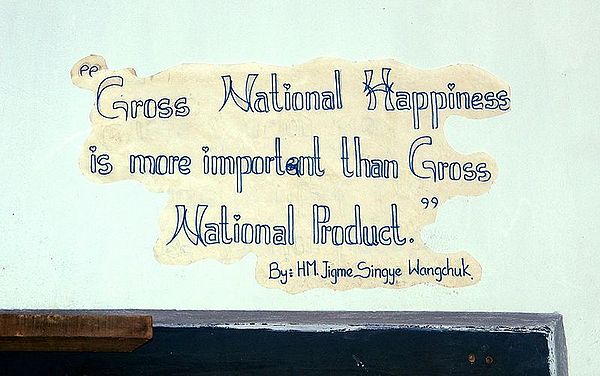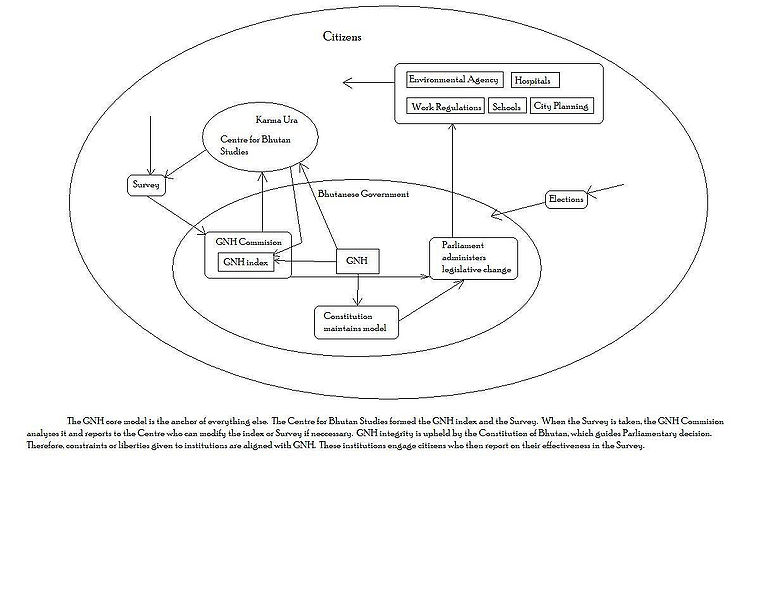Gross National Happiness
Contents
The Booty Shaking Breakthrough in Bhutan
It’s happened. Finally the breakthrough in governmental thinking for the future has taken its first step. Commodity driven economics are on tier with humanistic qualities, at least in one part of the world. Nestled in the bosom of the Himalayas, Bhutan has implemented the first policy of Gross National Happiness. Happiness may have many different meanings, but Bhutan has developed criteria that one would be hard pressed to argue against. Traditionally, Gross Domestic Product is the meter of progress used to measure the sum of all goods and services. Gross National Happiness uses this, yes, but only as it relates to the health of the people. In this way, well-being and progress are fused into a sustainable, teamwork oriented process working towards contentment. This concept of Gross National Happiness is crucial in forging a civically intelligent future.
Industry and technology have undoubtedly lifted the antique burdens of survival to those who have access to them, but there are many in the world who are left without these benefits. Along with the ill effects that these processes have had on the environment, humans are faced with novel burdens that require adjustment to the modern modes of existence. A radical revolution of violence and dissemination is not needed. More productive would be an approach that tweaks a few fundamental variables in an established and proven system. We look to sociological evolution rather than revolution. For instance, fully converting to clean renewable energies would offset carbon emissions and prevent further ecological devastation. Providing universal health care would get vital medicinal technologies to the impoverished and needy. The first step in making these changes is with the economics in place. Capitalism has proven fruitful for some, while at the same time disappointing to the point of devastating for most. Again, an overthrow of the system is not needed. Bhutan’s model serves as a perfect example of how a few amendments to GDP will profoundly alter the outcomes of economic policy.
Gross National Happiness
Where did Gross National Happiness begin? The term sprang from the 4th King of Bhutan, His Majesty Jigme Singye Wangchuck’s coronation address as he expressed his desire to preserve the Bhutanese way of life at the dawn of modernization. His declaration that “Gross National Happiness is more important than Gross National Product” was taken seriously. The declaration became a decree and the Centre for Bhutanese Studies, headed by Karma Ura, was recruited to research and develop the concept into a methodical index that can be used for practical application.(Weiner, 2008) Today, the index includes nine core principles that guide the formation of Indicators and institutions.
- Time Use is a measurement that uses both quantitative and qualitative scrutiny to show how well schedules promote success. By administering interviews to households, qualitative data supplies necessary information to make a concrete analysis of what Bhutanese are doing. In this way, qualitative and quantitative data are combined in a synergistic approach to accurately assess a complex topic. Mainly though, activities can be allotted into categories measuring time at work, time with family, time at social functions, time educating and learning, recreating, travelling, volunteering, and even sleeping. If it is apparent through the qualitative research that a valued past time is receiving inadequate attention, the institutions respond. Ultimately, a well rounded schedule gives opportunity for the other principles of GNH to have an effect.
- Psychological Well-Being is one of these principles. It is viewed in three aspects; general distress indicators, emotional balance indicators, and spirituality indicators. Mental illness rates and percentages of drug prescriptions give a clear view of the first two. Since spiritual well-being is so abstract and subjective, the Centre for Bhutan Studies has come up with the questionnaire administered to the population addressing time spent meditating and frequency of positive and negative emotions. Along with a general health survey, an individual’s profile shows whether they’ve met the threshold indicating sufficient psychological well-being.
- The next principle is Community Vitality. The biological definition of a community is a group of organisms interacting in a shared environment. Strong relationships indicate sturdy framework in a community. Bhutan takes measure of this with a survey on family and neighborhood dynamics. Community Networks can provide means for strengthening these dynamics.
- Community vitality is tied to another principle; Cultural Diversity and Resilience. Each community has its own culture. The ability to enact the values to younger generations births vivacity. This relies on affluent interaction in neighborhoods. The indicators for this are very specific to Bhutan, looking at the acquisition of traditional dances and folklore. The Power of Story is an important aspect in this principle.
- Physical Health is undoubtedly a crucial aspect in creating happiness. The number of nerve endings in the intestines matches the amount that is in the brain. More information is actually sent from the body to the brain than from the brain to the body.citation needed Since the mind is a part of the body, a healthy body creates a healthy mind. Indicators look at the occurrence of illness, knowledge of how disease is spread, and how near to households health facilities are located.
- Education develops problem solving skills and gives multiple perspectives, which are essential in overcoming obstacles to happiness.[1] Level of education shows how well institutions encourage self motivated learning and personal inquiry. Literacy rates offer insight into the access of knowledge. Other indicators inspect specific languages of Bhutan. Education and Values are effectively linked in this way.
- Ecological Diversity and Resilience could be the most important value in maintaining a country’s livelihood. In the same way that strong interconnectedness in communities mothers vitality, strong interrelations of the biosphere breeds resilience.(Campbell, 1999) Countries can avoid famine and drought by nurturing their natural landscapes. Adopting ecological wellness as a value created indicators inquiring into individual sense of environment. Questions address personal reports on pollution and botanical knowledge. In this way, Earth’s Vital Signs are monitored and Voices for the Unheard find audience.
- Living Standard is a good indicator of the opportunities for happiness. Once basic needs such as shelter and food are met, more elaborate means of comfort can be pursued. A household’s income, food ration, and living situation are included in the index questionnaire.
- The last index principle is Good Governance. The survey asks directly how one feels about the government’s performance in creating equitability and deterring corruption. It asks how much trust is placed in the institutions as well as the media. And finally, addresses how well their freedoms of speech and freedom from discrimination are upheld.
How It Works
In order for it to work, human needs must be placed as the central focus of production. As values come to embody biological needs such as warmth, compassion, empathy, love, food, and shelter, they shape the [indicators] that monitor the distribution of goods and services that encourage them. Appropriate indicators are necessary for the adhesion to the 9 principles. A survey of both multiple choice and written responses developed by the Centre for Bhutan Studies is given to the public. Answers given in the survey are numbered. Lowered numbers indicate deficiency and higher numbers mean sufficiency has been met. Within the government body, the GNH Commission (working with the Centre for Bhutan Studies) receives and analyzes the surveys and makes a formal report on what principles are not being upheld. Government run institutions can then respond immediately. Institutions outside this sphere respond to parliamentary rule, which creates bills and other measures that are pertinent to the results of the survey. Additionally, proposals for policies must pass through a policy screening derived from GNH principles, developed by Karma Ura. A screening process is in place for projects as well.
Analysis
Measurements in the survey are very subjective. This is the distinguishing characteristic from GDP. GDP doesn’t normally take into account the suffering involved in natural disasters, but national crisis such as hurricane Katrina bring about large amounts of spending, which is good for the economy. The same is true for militarism. The United States spent $698 billion with the military budget last year.[2] This accounts for 20% of tax dollars and has increased 81% over the last decade.[3] All of this spending contributes to the GDP, supposedly signifying progress. The health care industry in the States fuels our GDP as well. Preventative health care increases health but decreases the need for treatment. Citizens spent $572 billion on health costs in 1996, 15% of which were for cardiovascular disease.[4] If preventative health care withdrew the greater portion of that spending, it would show a significant drop in GDP, indicating a lack of progress. Good health is valued by Americans. Acquiring it is progress. These conflicting views of progress are clear examples of the need for subjective data and not just statistics in determining progress.
The inclusion of subjective data may be the hardest pill to swallow for traditional economists. It perhaps evokes too much discomfort having malleable indicators that take critical thinking to analyze. Policy makers are much more comfortable with concrete data to work with. It is with the fusion of the two that Bhutan hopes to gauge an accurate account of the people’s well-being and furthermore, how to encourage it. Since its inception in the 1970’s, GNH has progressively moved towards a more attainable system of measurement. As time continues, the index is becoming more quantifiable. The questions remain purely subjective, but by finding questions that cover the essential topics, trends become evident. The dynamic process is responsible for its effectiveness.
Bhutan has highlighted another flawed concept of GDP. Based on commercialism, GDP’s concept of progress focuses on increase. If increase is allowed to go unchecked, it depletes the resources that contributed to its rise. Sustainable solutions are built into GNH. The survey’s goal itself is to determine if a person’s situation is sufficient. There is a cap on the measurements. Anything over the minimum of sufficiency is not valued. So you only get acknowledgement for attaining what you need and not excess. The ecological principle upholds environmental sustainability as well. The main difference in Bhutanese GNH is the belief that progress is centered on “being satisfied with life”. Institutionalizing these values keeps economic growth in check. This, in turn, preserves a whole other array of goods, including natural resources. For countries such as the United States and China, this philosophy could drastically influence our livelihood for the future. Our environmental impacts are excessive and detrimental.[5] As the largest consumers of oil, we undoubtedly add to the ill effects.[6] Worsening environmental conditions such as droughts and hurricanes are only going to call upon more resources to counter the problems they impose. Reducing the need for resource extraction and industrial production will reduce the harmful impact.
Application in the U.S.
Accepting GNH in the United States is a matter of buy in. Less ‘spiritual’ than Bhutan, the case could be presented with a practical, worldly approach that may appeal to the rational, scientific minded public. There is actually a model already in place in the States. GPI is the Genuine Progress Indicator and is used in Maryland, Minnesota, Utah, and the city of Oakland to name a few. GPI is a good alternative for American audiences in that it has more familiar cultural terminology. These changes highlight the true implications, quelling any assumptions that it is a fanciful pursuit.
Obstacles
Affluence of GNH in the States is combated by several factors.
- Spirituality
- Aside from completely countering the secular measure of progress that has been used for decades, Bhutan has determined their core principles based on Buddhist values. The State and Religion must remain separate as defined in the 1st Amendment. So deciding the values would have to come from a more organic source. How would this nation of 311,361,590 come to consensus, compared to the 708,427 in Bhutan? The Good Life pattern card could be used here. It is important that fundamental aspects of what constitutes a good life be identified. Bhutan employed the Centre for Bhutan Studies for the task, citing Buddhist texts as their starting point. We could use a similar tactic by imploring academic institutions to research and develop an index, using instead a scientific analysis of what keeps human beings healthy and content. A referendum on their conclusions would either accept or decline the principles. From there, the index could be developed further.
- Tradition
- Even after implementation, the cultural change alone is vast. The traditional “American dream” is about attaining for yourself. One of the founding beliefs of GNH is that happiness is shared. Happiness relies on the interplay of relationships in a community. I see the engagement of sustainability as the first step to altering views on success. The awareness of the interplay of relationships in the environment being imperative to our survival as a species parallels the awareness of the crucial interplay of relationships among people being imperative to individual survival. It encourages cooperation. And with the world in balance, we would have time to accommodate change. By Transforming Institutions to fit the GNH model, cooperation among businesses would grow. Opportunity for community exchange would be made easier through that change as well.
- Vested Interest in GDP
- If the values adopted are anything like Bhutan’s, material gain will be devalued. There are many corporations that have a vested interest in consumerism. It is important though to realize that material is important for well-being. But what and how much may be called into question. It is a matter of creating a consumer market that has values placed in the necessary goods; like healthy food, preventative medicine, sustainable technologies, and effective schooling. The corporations will bow to consumer needs. Integrating the values into the successful model of consumerism could spread the change efficiently and equitably. It is a matter of Social Responsibility on the corporations’ part, another pattern card. The values supported by the people along with the principles endoctrined in the index require responsibility both external and internal to the entity.
What Can We Conclude?
Ultimately, Gross National Happiness is the embodiment of the Alternative Progress Indices pattern card. The need for appraisal of human values to compliment the economic welfare of a people can be a very good way to create equitable opportunities and provide sustainability in both economic and ecological terms. It is clear that GDP alone cannot determine an accurate route for a successful future. Environmental squalor and the fiscal costs associated with violent or destructive aspects of society diminish quality of life and do not encourage benevolent behavior. GDP does, despite all its flaws, show us how efficiently our resources are being used in a clear cut, easy to see picture. How well our financial needs are being met could not be measured better. The productivity of businesses has been improved almost unfathomably from the insight of monetary exchange between extraction, production, and use. But even prominent GDP developer Simon Kuznets acknowledges that “The welfare of a nation can scarcely be inferred from a measurement of national income… Goals for ‘more’ growth should specify of what and for what.”(Kuznets, 1962) GNH is the yin for this yang. The indications of its measurements suggest what goods or services need to be increased and for how long. When the need is met, resources can be allocated elsewhere, creating equitable development. GNH by itself is not all encompassing either. Focus only on spiritual fulfillment may overlook deficits in business interaction. If the economy stagnates, GNH offers little in the ways of remedies. When Gross Domestic Product and Gross National Happiness are taken into account equally, the most truthful representation of the country’s status may be realized. They offer the most holistic approach to analyzing progress. GNH will show where the challenges lie, and GDP will show the means by which they can be met. The integration between government, business, and private spheres supports civic intelligence on the highest level. It supports the proliferation of many other capacities of civic intelligence that are inherent to the good of communities of all sizes. Examples include Sustainable Design, Future Design, Value Sensitive design, Sustainability Appraisal, Dematerialization, Whole Cost, Participatory Budgeting, Grassroots Public Policy Development, Citizen Diplomacy, Collective Decision Making, Working Class Consciousness, Big-Picture Health Information, Indigenous Media, and Shared Vision among others. In our changing world, this integral way of understanding progress can carry us gracefully into the future. Namaste.
References
Weiner, Eric. "The Geography of Bliss." Twelve, 2009. pp 49-95
Ura, Karma. "Explanation of GNH." GNH Methodology. 2008. April, 2011. http://www.grossnationalhappiness.com/gnhIndex/intruductionGNH.aspx
Schuler, Doug. "Patterns." Liberating Voices: A Pattern Language for Communication Revolution. 2011. May 2011 http://www.publicsphereproject.org/drupal/
Campbell, Neil. Reece, Jane. Meyers, Noel. "Biology." Greene, 1999. pp 960-974
1. Stephenson, Susan. "MONTESSORI AGE 12-18." 1995. April, 2010. http://www.michaelolaf.net/montessori12-18.html
2. Legum, Judd. "Report: U.S. Military Spending Has Almost Doubled Since 2001." April 11, 2011. May, 2011. http://thinkprogress.org/2011/04/11/military-spending-doubled-since-2001/
3. Sammon, Richard. "How Your Tax Dollars Are Spent." April 11, 2007. May, 2011. http://finance.yahoo.com/taxes/article/102817/How-Your-Tax-Dollars-Are-Spent
4. "Medical Care Spending - United States." May 2, 2001. May, 2011. http://www.cdc.gov/mmwr/preview/mmwrhtml/00032336.htm
5. Anderson, David. Boesch, Donald. Burkett, Virginia. "Key Findings" USGCRP Scientific Assesments: Global Climate Change Impacts in the U.S. January, 2011. May 2011. http://www.globalchange.gov/publications/reports/scientific-assessments/us-impacts/key-findings
6. "Energy Statistics: Oil Consumption (Most Recent) by Country." 2009. May 2011. http://www.nationmaster.com/graph/ene_oil_con-energy-oil-consumption
Kuznets, Simon. "The New Republic." October 20, 1962, cited in Cobb, Clifford, Ted Halstead, and Jonathan Rowe, "If the GDP is Up, Why is America Down?" The Atlantic Media Co., 1995. pp 67
Not Cited
Ravitch, Diane. "Standardized Testing Undermines Teaching." April 28, 2011. April, 2011. http://www.npr.org/2011/04/28/135142895/ravitch-standardized-testing-undermines-teaching
"U.S. PopClock Projection." Census 2010. 2010. May, 2011. http://www.census.gov/population/www/popclockus.html
my brain



